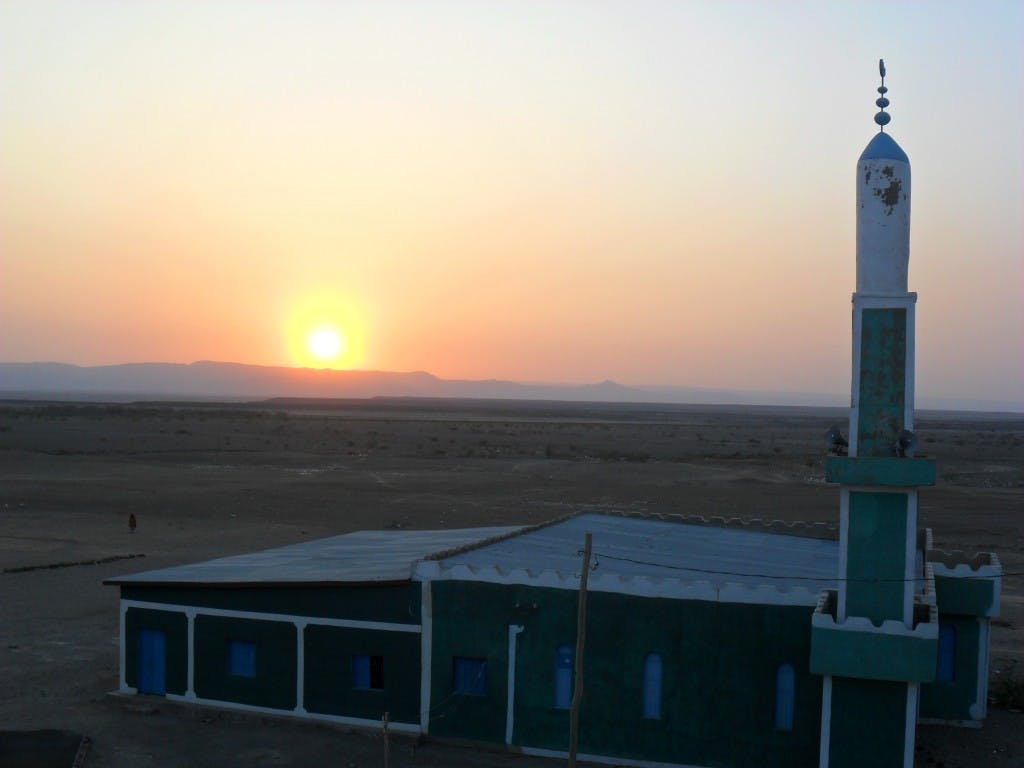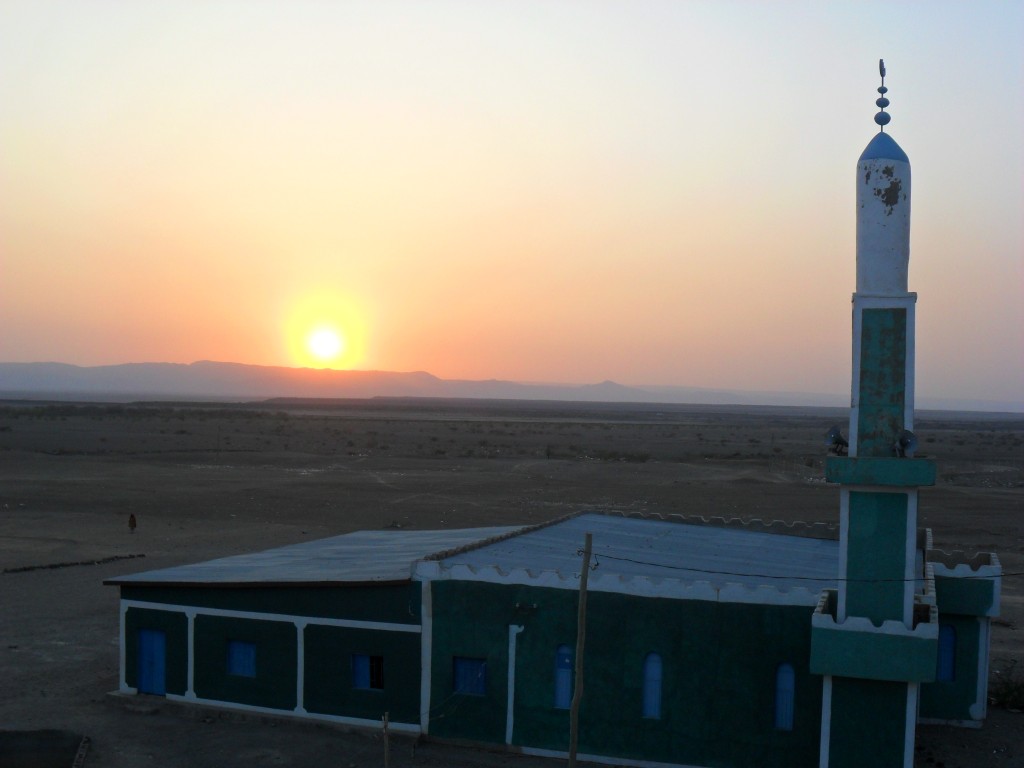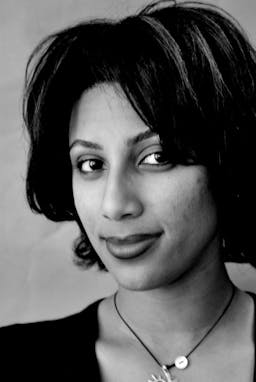A Powerful Weakness
Jan 21, 2015
First story


I’ve always thought Afar to be a far away region of mystics; unbearable heat, pastoralist locals who cruelly circumcise their women, ‘highlanders’ that moved there and introduced commercial sex work, and the Ethio-Djibouti corridor that has paved the way for goods and HIV. But recently I visited a far more appealing Afar. Although these facts can still be used to paint a very basic picture of the region, I also found it to be a place where they have beautiful sunsets, communities becoming more open to and appreciative of outside culture, a place where highlanders have created business spaces that allow one to sit and enjoy stars at night, and where women are, in fact, respected and feared.
A 45 minute drive past Semera, the capital of Afar, through the sweltering heat and steaming landscape will lead you to Aframbo, a tiny but boisterous village that seems forgotten by time. The men hang around the narrow dirt road cleaning their teeth with a Miswak twig and the women…well…the women were just nowhere to be seen. Our host, Mariam, hopped into our car at the time we agreed on and led us to a cluster of huts that she explained belonged to a family. Large plastic and straw mats were brought out under the shade for us to sit on and slowly the women followed suit. Communicating with these women was easy; we were bound by what makes life difficult for women all over the world. However, our similarities ended when they explained to me that they were the ones who built the dome-like shaped huts that spotted the courtyard. These domes are built in the spare times they find between herding their camels and goats, finding water, cooking food and storing the uncooked for the next meal. And in case I had any doubts about their dedication to their routine and life style, they also brought me snacks using plates and clay cups that made with their own hands. Even the beautiful colorful straw mats we were sitting on were made with their hands. At this point, two men had wandered closer and they became the recipients of my horrified looks. ‘But what do they do?’ I asked pointing at the men but also directing the question at them. The women looked indifferent and the men ginned sheepishly. “They eat and they sleep” Mariam answered for them all. In my world, women only had to prove that they could do things as well as any man, any motivation to do things better were personal not imposed. But here in Aframbo, Mariam and her friends weren’t trying to prove anything. This is their reality. Their wealth, happiness and power lies in satisfying everything that allows their men and families to be who they are. I felt a confusing mixture of admiration and pity for them, admiration that without them their families would perish but pity for their thankless job reflected on the faces of the two men still grinning broadly.
Seated next to me was Afrah (name changed). Afrah’s daughter and son-in-law had died (of what no one would tell me directly, which added to my suspicions that it might be HIV) but their children were as good as her own. Through Miriam’s translations, I understood that they were all high school and college students now, which meant they lived in town, away from their grandmother and all their responsibilities towards her. This was another growing trend in Afar; the brutality of battling the desert for their livelihood being too much, Afaris are now leaning towards education and the lifestyle that comes with it. The pursuit of this lifestyle leaves little space for elders like Afrah and their now ancient existence.
Because of the nature of the Afaris lifestyle, I think there has always been little scope for a city girl such as myself to relate to their perspective; a perspective that is less complicated by factors that follow me to work and back home every day, and influenced more by cultural ones. So after a day or two in Afar it becomes clear that for an Afari man, his wealth lies in his herd; his happiness in his family and his power in is tribe. Anything else is an addition that doesn’t occupy real space in their world. But what about the woman? Where does her wealth, happiness and power lie?
I learned that it lies within herself. The interesting thing about Afari women is that as vulnerable as they seem, and even though it is true that their day to day toils afford them little time to take care of themselves or be cared for, they are quite important and respected in the larger framework of their social setting. Miriam haughtily (and rightfully so!) explained to me that it is absolutely unthinkable for a man to physically or otherwise harm his wife. In addition to the shame in such a deed, any man who dares to strike his wife or deprive her of her rights is punished by his tribe. Although Miriam was speaking to me in Amharic (one of the widely spoken official languages of Ethiopia but not by the women in this circle) they all picked up on her enthusiasm and body language and nodded in agreement. Looking at all the women around me, from the youngest one holding her year old child to Miriam, to Afrah, the view struck me as a sad and noble cycle, where the women in Aframbo will always do their best for others but in the end have no one to depend on but themselves. Their culture and religion does protect them from abuse in times of marital disputes and divorce, but not from this harsh reality which they are born into and taught to accept.
By now, the two men were bored of my accusing looks and had returned to cleaning their teeth with their friends by the side of the road, but it was clear that these rights Miriam was talking about were clearly understood by them as well. And it is with this understanding (and guarantee) that they wake up at dawn and ceaselessly provide for their families. In Afar, women don’t see their world as them versus men, they see it as women versus duties to their families, a challenge imposed on them by nature and God, and one which they spend every day proudly fighting hard to fulfill. To women, female circumcision (or female genital mutilation as others prefer to stress it) is but mere check point to be passed on a greater journey.
In the city, our social construct now earns us women recognition, admiration and yes even the right to slack sometimes (because…hey…we’ve paid our dues over the past centuries). I don’t know what its like to battle everyday like Miriam and her neighbors in Aframbo, but I know it takes more than education, sophistication and all the other things we have been endowed with in the cities to win such a battle. From what I saw in Aframbo, It takes dedication to a cause that is only visible to an inner light, rooted in history and fuelled by humility. It takes allegiance to a power bigger than oneself, a worthy weakness, an understanding that there are those for what needs to get done, and there are those for everything else. Afari women choose to be those who get things done, and it’s this way that they achieve their wealth, happiness and power. They showed city girl like me an alternate and powerful route.




